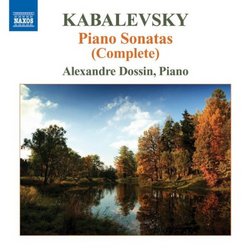| All Artists: Dmitry Kabalevsky, Alexandre Dossin Title: Kabalevsky: Piano Sonatas (Complete) Members Wishing: 0 Total Copies: 0 Label: Naxos Original Release Date: 1/1/2009 Re-Release Date: 4/28/2009 Genre: Classical Styles: Chamber Music, Historical Periods, Classical (c.1770-1830), Modern, 20th, & 21st Century Number of Discs: 1 SwapaCD Credits: 1 UPC: 747313082278 |
Search - Dmitry Kabalevsky, Alexandre Dossin :: Kabalevsky: Piano Sonatas (Complete)
 | Dmitry Kabalevsky, Alexandre Dossin Kabalevsky: Piano Sonatas (Complete) Genre: Classical |
Larger Image |
CD Details |
CD ReviewsKabalevsky is not a "Prokofieffigy" Dace Gisclard | Houston, TX | 05/05/2009 (5 out of 5 stars) "Kabalevsky, for all of the heavy influence of Prokofiev on his style, really can't be played with complete success in the same "fingers of steel," "demon-driven" manner on which so much of Prokofiev thrives. Both composers were eclectics, but as much as one may love Kabalevsky, it also has to be admitted that he was not as skilled as the elder composer in absorbing outside influences into his own style without having the joins show. These statements are NOT meant as a putdowns--they're merely true.
In this valuable new release from NAXOS, Alexandre Dossin demonstrates his understanding of this composer's derivative idiom, and makes no attempt to turn Kabalevsky into "Prokofiev II." For this, his interpretations of this music are all the more convincing and compelling. Kabalevsky may not be "profound," (whatever that overworked word means) but this is a delicious disc--bravo! The major items here are the three piano sonatas. Besides the pandiatonicism of Prokofiev, these works exhibit many other influences. In No.1, the harmony is often Scriabinesque. Tchaikovsky haunts the slow movement, with a melody in the tenor register surrounded by lyrical figuration. In the finale, certain gestures remind me of the finale of Scriabin's No.3. There are even what sound like momentary references to "The Volga Boatmen" (surely unconscious?) and the ghost of the opening of the sonata returns toward the end. Sonatas 2 and 3 were conceived almost simultaneously. The highly virtuoso No.2, besides being influenced by the Prokofiev of the "Soviet" period, has something of the brooding grandeur of Mussorgsky and the nervousness of Stravinsky. The thrilling drive of the finale is as close as Kabalevsky comes in these sonatas to the motoric Prokofiev of the Toccata. No.3 is the most familiar of the three, and Dossin's performance compares favorably with those of Horowitz, Zak and Scherbakov. In general, it is the most lyrical of the three, yet the manner in which the gentle opening is distorted and torn apart in the development into a poisonous perversion of itself and then returns to its former unassuming tone is unsettling. The second movement recalls the lyrical portions of Prokofiev's "Romeo and Juliet", whereas the finale is playful. Dossin demurs from playing the sonatinas with virtuoso condescension, keeping tempi near what might be expected from a gifted teenager. This is, after all, the performing level at which the music is targeted. For the most part, it works beautifully. Perhaps Dossin tries to wring too much depth out of the first movement of Sonatina No.1 with a few rubati that are wise beyond the emotional reach of the music, but nothing really objectionable takes place. Dossin plays Sonatina No.2 of 1948 in the 1969 revision. In the first movement, the texture is bolstered with a few octave doublings, and the recapitulation, which, in the original was quite literal, is shortened and partially recomposed. The third movement--a Moderato in alternating triple and quadruple meter--is omitted, and therefore the original fourth movement becomes the third! (FYI, Murrary McLachlin, on his long OOP discs for Olympia, played the original version.) It's still possible to find Murray McLachlan's OOP CD's of Kabalevsky's piano music on AMAZON at very high prices! I've not heard them, but from what I've read, it sounds like his playing may be too high-pressured for Kabalevsky. In "Gramophone" of April 1993 Bryce Morrison called McLachlin's Kabalevsky "rushed and graceless." Dossin's technique is excellent, and he projects an understanding of the composer's personal voice. He observes the markings in the scores carefully, yet sounds spontaneous. The recorded sound is round, natural and beautiful. McLachlin's CD's might be just as good, but I don't see how they could be any better, and Dossin's is easily available right now. Dossin makes Kabalevsky's case without overstating it. What more could one want? Highly recommended--now come on, NAXOS, where's Volume 2? Update: Volume 2 is now available (Kabalevsky: Preludes (Complete); Preludes and Fugues)." |
